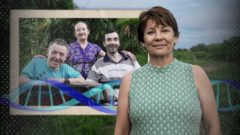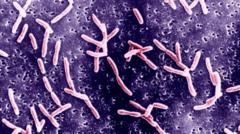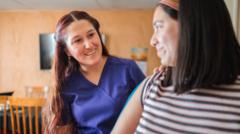Before geneticist Silvana Santos made her pivotal contributions over two decades ago, the small northeastern Brazilian town of Serrinha dos Pintos remained in the dark regarding a mysterious ailment affecting numerous local children. In this isolated community of less than 5,000 residents, many children were unable to walk, leaving families without answers until Santos identified an entirely new genetic disorder known as Spoan syndrome.
The syndrome, triggered by a genetic mutation, causes progressive nervous system deterioration and manifests only when both parents carry the altered gene. Santos's findings were groundbreaking as this was the first time the condition had been acknowledged globally, earning her recognition as one of BBC's 100 most influential women of 2024. Residents of Serrinha now speak of Spoan with awareness and understanding, thanks to the diagnosis Santos provided.
Santos's had personal ties to Serrinha, stemming from her relatives who hailed from the community. There she found a surprising prevalence of cousin marriages, a social norm encouraged by the town's geographical isolation that bolstered shared family ties. It is estimated that in Serrinha dos Pintos, over 30% of couples are related, leading to heightened risks of genetic disorders. While most children born to cousin couples are healthy, the chance of genetic anomalies increases. Studies indicate that having a child with a rare disorder is approximately 5-6% among cousins, compared to 2-3% for unrelated couples.
Santos undertook a meticulous approach to uncover Spoan's roots. Her investigative journey involved traversing 2,000 kilometers between São Paulo and Serrinha, collecting DNA samples from families while unraveling local narratives. After seven years dedicated to fieldwork, the team published their findings in 2005, identifying the genetic mutation linked to Spoan.
According to Santos, the mutation—originating from European settlers—has ancient historical ties, confirmed by genetic studies linking cases in Serrinha to shared ancestry with individuals in Portugal and even Egypt, emphasizing how global migration has profound implications on genetics in isolated communities.
Despite limited advancements toward a cure, increased awareness regarding Spoan has resulted in changes in community narratives and accessibility for patients. As children with Spoan were often stigmatized, Santos's work has shifted perceptions and allowed those affected to receive wheelchairs and care. However, as age progresses, the physical limitations become more pronounced, leading to increasing dependence on caregivers.
In a bid to further elucidate genetic risks for future generations, a new research initiative, supported by the Brazilian Ministry of Health, will screen 5,000 couples in Serrinha for genes associated with severe recessive disorders. The goal of this project isn't to discourage cousin marriages but to empower families with knowledge about genetic risks.
As she continues to draw from her experiences in Serrinha, Santos’s legacy is entwined with the community’s identity, exemplified by the connections she maintains with families affected by Spoan. Her ongoing commitment fosters not only scientific understanding but also a sense of belonging for the people of Serrinha dos Pintos.













